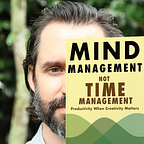Make the pursuit of curiosity your metric for success
To know whether something is worth doing, or to know whether something was worth having been done, you need a metric for success.
Many people look at revenues, or pageviews, or app installs. If they have to decide between doing two things, the one with the most potential gets done.
Next time you’re deciding what’s worth doing, try this metric. Ask yourself: What am I most curious about?
Before I go further, know that if revenues, pageviews, app installs, or Ivy League degrees are really important to you, don’t listen to me. I’ve never tried to maximize on any of those, and I’ll never be a billionaire. When someone talks about those things, my first instinct is to reach for an ice pick I can drive into my parietal lobe.
Sure, there were times, when I was younger, and more impressionable, where I tried to fight my urge to follow my curiosity. I almost took the higher-paying job, I dabbled in A/B testing before my business needed it.
I slowly learned that following my curiosity was better. If I wanted to lock myself in my dorm and read obscure books about typography—when I had other assignments—I stopped worrying about the outcome. Same if I wanted to teach myself CSS or start writing a blog or take that job in Silicon Valley even though I didn’t know what a VC was.
All of that lead to a convergence of curiosities, my first book.
I’ve doubled down on curiosity. I read books I’m curious about, and I ask the authors the questions I’m curious about on my podcast. Then, I write about what I learned here on Medium. It all works in a virtuous cycle of curiosity cultivation. Interestingly, it still grows my main business of selling online courses.
The example on your mind is Steve Jobs. How he dropped in on that calligraphy class. How he was captivated by the letterforms. How it had no practical application at the time. Then he built it all of that typography into the first Mac. “You can’t connect the dots moving forward.”
But, I won’t mention that. You already know that example, and Steve Jobs examples have lost their effect, the way a double of Maker’s Mark won’t give an alcoholic a buzz.
Instead, let me dissect for you the power of curiosity:
- You work harder on what you’re curious about. When was the last time you lost track of time working on something? If you’re curious about something, you’ll worker harder than the next person, who is just trying to maximize some other metric. Pomodoro technique: If you need a break after 25 minutes, you should ask yourself if you’re really curious about your work.
- Curiosity gets you ahead of the competition. If you follow your curiosity, you’ll end up somewhere nobody else is. Meanwhile, people who aren’t curious are scanning TechCrunch, trying to figure out who they “should” catch up with. They create a whole universe of the uncurious, parroting something someone else told them.
- Curiosities converge. Now you’re untouchable. Once you’ve followed your curiosity to several different tributaries, those tributaries will converge. Then, you’re completely, utterly, untouchable. You’re not the best programmer, you’re not the best marketer, you’re not the best cupcake baker, but you’re the best at all three combined. Nobody worked as hard on those few different things to be anywhere near you. This tends to take 3–5 years for me each cycle.
You don’t have to be a solopreneur to do this. Dan Ariely explained on my podcast (18:25) how he uses curiosity to get the best work out of the best people.
If you make a habit of following your curiosities, you’ll work harder, and it will lead you somewhere amazing.
When you follow your curiosity, you Choose Yourself. James Altucher is on my podcast next week. Subscribe, because you’ll learn a lot »
